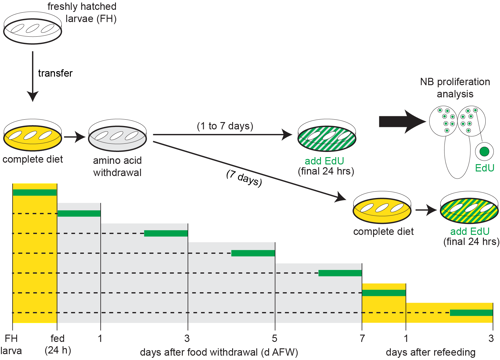
Cell proliferation is coupled with nutrient availability. If nutrients become limited, proliferation ceases, because growth factor and/or PI3-kinase activity levels become attenuated. Here, we report an exception to this generality within a subpopulation of Drosophila neural stem cells (neuroblasts). We find that most neuroblasts enter and exit cell cycle in a nutrient-dependent manner that is reversible and regulated by PI3-kinase. However, a small subset, the mushroom body neuroblasts, which generate neurons important for memory and learning, divide independent of dietary nutrient conditions and PI3-kinase activity. This nutrient-independent proliferation is regulated by Eyeless, a Pax-6 orthologue, expressed in mushroom body neuroblasts. When Eyeless is knocked down, mushroom body neuroblasts exit cell cycle when nutrients are withdrawn. Conversely, when Eyeless is ectopically expressed, some non-mushroom body neuroblasts divide independent of dietary nutrient conditions. Therefore, Eyeless uncouples MB neuroblast proliferation from nutrient availability, allowing preferential neurogenesis in brain subregions during nutrient poor conditions.